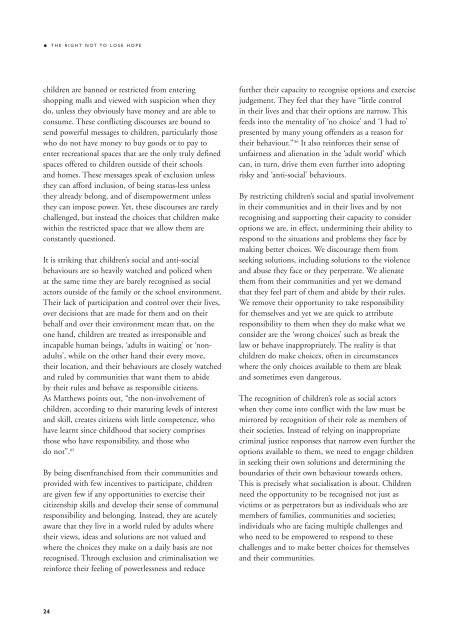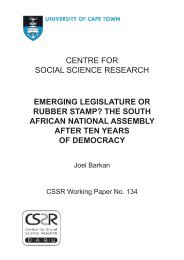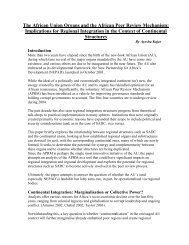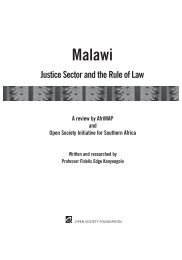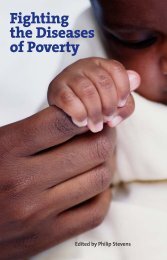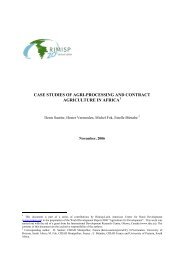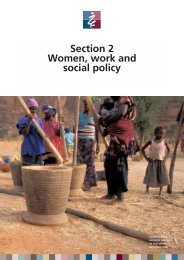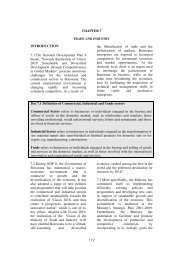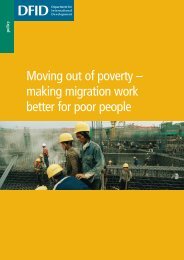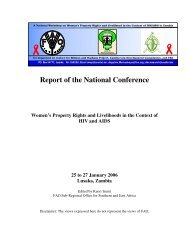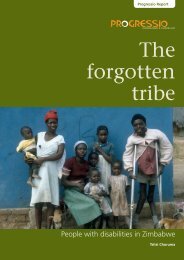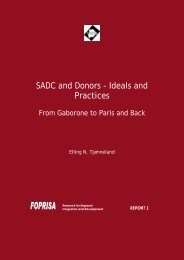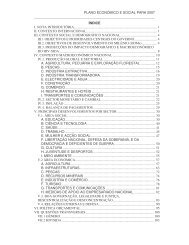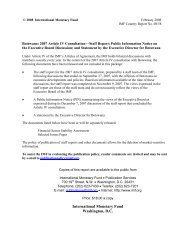The Right Not to Lose Hope - Violence Against Children - East Asia ...
The Right Not to Lose Hope - Violence Against Children - East Asia ...
The Right Not to Lose Hope - Violence Against Children - East Asia ...
- No tags were found...
You also want an ePaper? Increase the reach of your titles
YUMPU automatically turns print PDFs into web optimized ePapers that Google loves.
● THE RIGHT NOT TO LOSE HOPEchildren are banned or restricted from enteringshopping malls and viewed with suspicion when theydo, unless they obviously have money and are able <strong>to</strong>consume. <strong>The</strong>se conflicting discourses are bound <strong>to</strong>send powerful messages <strong>to</strong> children, particularly thosewho do not have money <strong>to</strong> buy goods or <strong>to</strong> pay <strong>to</strong>enter recreational spaces that are the only truly definedspaces offered <strong>to</strong> children outside of their schoolsand homes. <strong>The</strong>se messages speak of exclusion unlessthey can afford inclusion, of being status-less unlessthey already belong, and of disempowerment unlessthey can impose power. Yet, these discourses are rarelychallenged, but instead the choices that children makewithin the restricted space that we allow them areconstantly questioned.It is striking that children’s social and anti-socialbehaviours are so heavily watched and policed whenat the same time they are barely recognised as socialac<strong>to</strong>rs outside of the family or the school environment.<strong>The</strong>ir lack of participation and control over their lives,over decisions that are made for them and on theirbehalf and over their environment mean that, on theone hand, children are treated as irresponsible andincapable human beings, ‘adults in waiting’ or ‘nonadults’,while on the other hand their every move,their location, and their behaviours are closely watchedand ruled by communities that want them <strong>to</strong> abideby their rules and behave as responsible citizens.As Matthews points out, “the non-involvement ofchildren, according <strong>to</strong> their maturing levels of interestand skill, creates citizens with little competence, whohave learnt since childhood that society comprisesthose who have responsibility, and those whodo not”. 85By being disenfranchised from their communities andprovided with few incentives <strong>to</strong> participate, childrenare given few if any opportunities <strong>to</strong> exercise theircitizenship skills and develop their sense of communalresponsibility and belonging. Instead, they are acutelyaware that they live in a world ruled by adults wheretheir views, ideas and solutions are not valued andwhere the choices they make on a daily basis are notrecognised. Through exclusion and criminalisation wereinforce their feeling of powerlessness and reducefurther their capacity <strong>to</strong> recognise options and exercisejudgement. <strong>The</strong>y feel that they have “little controlin their lives and that their options are narrow. Thisfeeds in<strong>to</strong> the mentality of ‘no choice’ and ‘I had <strong>to</strong>’presented by many young offenders as a reason fortheir behaviour.” 86 It also reinforces their sense ofunfairness and alienation in the ‘adult world’ whichcan, in turn, drive them even further in<strong>to</strong> adoptingrisky and ‘anti-social’ behaviours.By restricting children’s social and spatial involvementin their communities and in their lives and by notrecognising and supporting their capacity <strong>to</strong> consideroptions we are, in effect, undermining their ability <strong>to</strong>respond <strong>to</strong> the situations and problems they face bymaking better choices. We discourage them fromseeking solutions, including solutions <strong>to</strong> the violenceand abuse they face or they perpetrate. We alienatethem from their communities and yet we demandthat they feel part of them and abide by their rules.We remove their opportunity <strong>to</strong> take responsibilityfor themselves and yet we are quick <strong>to</strong> attributeresponsibility <strong>to</strong> them when they do make what weconsider are the ‘wrong choices’ such as break thelaw or behave inappropriately. <strong>The</strong> reality is thatchildren do make choices, often in circumstanceswhere the only choices available <strong>to</strong> them are bleakand sometimes even dangerous.<strong>The</strong> recognition of children’s role as social ac<strong>to</strong>rswhen they come in<strong>to</strong> conflict with the law must bemirrored by recognition of their role as members oftheir societies. Instead of relying on inappropriatecriminal justice responses that narrow even further theoptions available <strong>to</strong> them, we need <strong>to</strong> engage childrenin seeking their own solutions and determining theboundaries of their own behaviour <strong>to</strong>wards others.This is precisely what socialisation is about. <strong>Children</strong>need the opportunity <strong>to</strong> be recognised not just asvictims or as perpetra<strong>to</strong>rs but as individuals who aremembers of families, communities and societies;individuals who are facing multiple challenges andwho need <strong>to</strong> be empowered <strong>to</strong> respond <strong>to</strong> thesechallenges and <strong>to</strong> make better choices for themselvesand their communities.24


